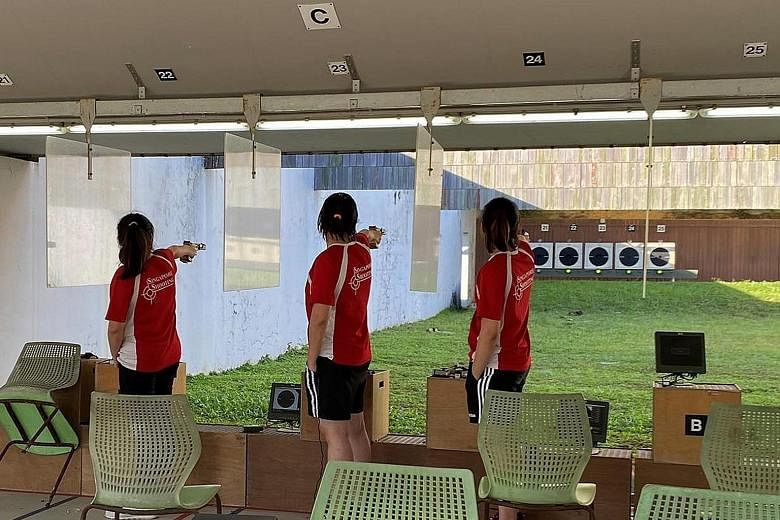A proposed law on guns, explosives and weapons discussed in Parliament yesterday aims to further tighten controls and strengthen penalties for high-risk items such as automatic weapons.
The changes also aim to address new threats posed by technology shifts, such as 3D-printed guns and drones mounted with weapons.
Among the changes proposed under the Guns, Explosives and Weapons Control Bill is one making the unauthorised possession of a digital blueprint of a gun or a gun part an offence, given the relative ease of manufacturing a working gun using a 3D printer and blueprint taken off the Internet.
The maximum fines for gun and explosive offences will also be raised to $50,000 for individuals and $100,000 for entities - up from the current $10,000 - to match the penalties for unlicensed activities involving explosive precursors.
The Bill addresses the threat of drones loaded with guns, explosives and weapons, by making it clear that a person who controls a vehicle or vessel carrying such items, even if via remote control, is treated as possessing them.
A class licensing regime for low-or moderate-risk users and activities was also introduced to provide some regulatory control without the need for individual licensing.
Such users include students who handle air guns as part of their co-curricular activities in schools.
With class licensing, such users need not be put through security clearance, and need not apply for or renew an individual licence periodically, although a class licence can be suspended with respect to a specific licensee if certain conditions are contravened, such as if someone is convicted of an offence under a related law. The proposed changes will also regulate shooting-range operations here to ensure their safety, an activity that previously did not require licensing.
Introducing the Bill yesterday, Minister of State for Home Affairs Desmond Tan said that the Bill reinforces the Government's position that any handling of guns, explosives and weapons is "a privilege that is conditioned on the overriding need to ensure we meet the objective of public safety and security, and that strict controls are required to achieve this objective".
The draft Act seeks to replace the Arms and Explosives Act, the Explosive Substances Act and the Dangerous Fireworks Act. It also seeks to make amendments to other legislation related to guns, explosives and weapons.
Mr Tan said that in developing the Bill, offences and penalties across the various laws were rationalised to achieve greater coherence, consistency and clarity.
"Regulatory breaches like non-compliance with licence conditions or unlicensed activities will be criminalised under the Bill, whereas actions with criminal intent will be offences under the other Acts and carry heavier punishments," he said.
Under the proposed changes, the Minister for Home Affairs will be vested with a new power to issue "security directions", when a situation requires a more expedient response than modifying licensing conditions allows, such as if there is imminent threat to life or property.
The minister can direct licensees and even those exempted from the Bill to immediately put in place enhanced measures, or to temporarily suspend, cease or scale down their activities for a period of time.
This cannot be appealed and is limited to six months, with non-compliance being an offence.
The list of weapons to be regulated will be expanded to include throwing stars and knuckledusters, which are very unlikely to have common day-to-day uses, added Mr Tan. Gun accessories such as flash suppressors and silencers that can enhance the performance of guns will also be regulated under the Bill, with lower penalties than those for guns as they pose a lower risk.
The threat of extremist attacks remains very real, he cautioned, with serious incidents in countries with strict gun and weapon control laws. "We must not presume that these attacks cannot happen in Singapore," he said.
The need to optimise resources to regulate a growing industry is another reason for the changes proposed in the Bill, said Mr Tan. The total number of gun, explosive and weapon licensees has more than doubled from around 2,000 in 2010 to over 4,000 last year.
The police must regulate this growing pool effectively, otherwise there is a risk of lapses going undetected, with potentially disastrous safety or security consequences, he added.
The draft Act also allows the Home Affairs Minister to prescribe items as prohibited guns, explosives and weapons, with related offences that will attract even higher fines of up to $100,000 for persons, and $200,000 for entities.
These are items which are identified as particularly dangerous or may be more readily concealed and would be particularly suited to unlawful use, such as certain types of automatic firearms commonly used by terrorists, said Mr Tan. "No licence will be granted for the handling of these items," he said.
Unauthorised possession of a digital blueprint for a gun or gun part would include physically owning a storage device with such a document, or storing such a blueprint outside the country, such as in an overseas cloud storage service.
But the intent is not to target those who could not reasonably be expected to have known that they possess such blueprints, such as someone who browses the Internet out of curiosity and finds a gun blueprint, which is temporarily stored in the browser cache, said Mr Tan.
Debate on the Bill resumes today, with over 10 MPs set to speak.



